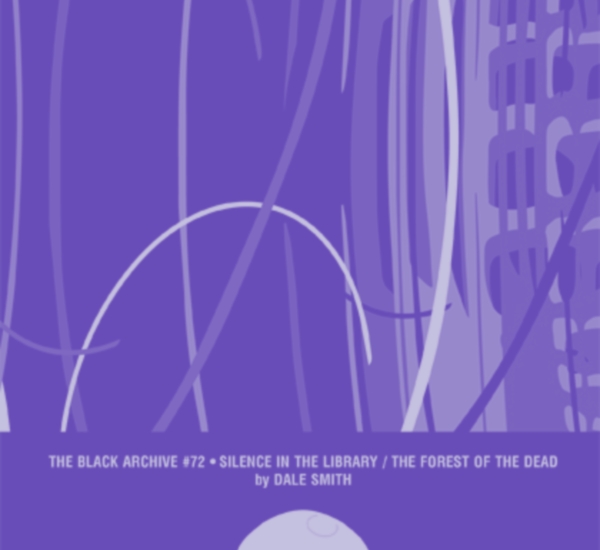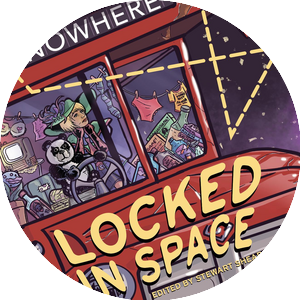Inspiration
It all began with River Song.
I’ve been rewatching 21st Century Doctor Who with my eldest, after she got into the show with Jodie Whittaker’s era. After we’d finished with all that, we needed to spread out into other eras. Instead of going in chronological order, she wanted to jump around the stories I thought were the best. This had the unfortunate side effect of meaning for the last few months, we’ve been watching the Who I like least. But to start with, it meant we got to revisit my favourite era of the show: any story that Steven Moffat was involved in writing.
Given her importance to the Moffat-as-showrunner era, River Song’s first story seemed like the best place to start.
It was, of course, even better than I’d remembered it. But what really struck me was how much Moffat seeded ideas that he would come back to later and how well he managed to make them work. I started to wonder at what point River Song’s parentage had been decided, how much of her last night with the Doctor Moffat already knew, and about the crash of the Byzantium. Oh yes, definitely the crash of the Byzantium, because with hindsight I could see that the reference didn’t work. Why was River asking the David Tennant Doctor if he’d been there yet when it would eventually be revealed that it had been Matt Smith’s Doctor? It was a rare piece of the puzzle that didn’t fit, where the reality of her story being written out of order poked through. I wondered if there were any more. I wondered if there might be a Black Archive in finding out.
The Pitch
Because it was River Song that I most wanted to talk about, I dropped Black Archive editor Philip Purser-Hallard an email to ask whether he’d consider a format busting book that just focused on her across multiple stories, and if not whether he’d be open to a pitch for a Silence in the Library/Forest of the Dead Black Archive instead. He got back in touch to say that because River had already been written about in other Black Archives, he didn’t want to go over the same ground and also break the format. But if I had a pitch for something that talked about River in the context of Silence of the Library/Forest of the Dead, he’d be happy to see it.
So I went away and thought about what that book would look like. If I talked about River, there were two things I knew I wanted to look at: just when she actually became River Song in Moffat’s head, and how she fits into the canon of strong Moffat women. I also wanted to talk about how her death altered across Moffat’s era, starting as a victory from the jaws of defeat save in Forest of the Dead to becoming an act of emotional avoidance by The Name of the Doctor. This would also let me talk about the idea of artificial reality in general, and whether or not we were living in a simulation.
Since I was writing about Silence in the Library/Forest of the Dead specifically, I knew I would have to write something about the Library that the story is set in: I had just read an article about Hernando Colon, the last man who had read every book ever written (spoilers, he hadn’t), and his story of setting up one of the first universal archives looked like it could fit in nicely with Moffat’s idea of the Library. And finally, there were the Vashta Nerada themselves, the ostensible villains of the piece who I had seen described somewhere as being weaponised fear of the dark. The idea would give me the opportunity to both talk about the use of fear in Doctor Who in general, but also the idea that Moffat was the one who wrote the scary ones.
I’ve said before on this site that I like five chapters for a Black Archive proposal, but I don’t think I’ve said before exactly how I turn them into a pitch. I’ve never seen any other writer’s pitch for a Black Archive, so this probably isn’t how they do it, but I create a simple text file with each of my ideas for a chapter: using those as headings, I simply bullet point each idea I have for something I want to say. So for my opening chapter, the first three bullet points were:
- Moffatt’s vision of Who as essentially terrifying.
- Who’s history of generating complaints when it gets too scary.
- Empty Child and Girl in the Fireplace as zombie movies: body horror and the slow menace gradually overcoming you.
Not only do I think this gives a good idea of what the final book will be, it translates quite well - with a bit of jiggling about - into a structure for the book once I start. Once I’d done that for every chapter, I gave it a polish and sent it off the Philip in February 2023.
Getting the Story
Whilst the pitch was with Philip, I was also writing The Greatest Show in the Galaxy’s Black Archive, so there was a slight gap whilst that was finished. As I sent off the final approved edit of that book, I got a reply from Philip on 21. June saying that the editorial team were happy with the pitch. I was given the green light to start working on The Silence in the Library/Forest of the Dead.
I was pretty convinced that this was going to be my last Black Archive, simply because there were no other stories (bar one I’d pitched for and been rejected) that I thought I had anything substantial to say about. Because of that I wanted to do it properly. Having interviewed Blade for my last Black Archive, I liked the idea of pushing myself out of my comfort zone and maybe interviewing Moffat about his work. To do that, I wanted to be prepared: I started gathering every interview with him that I could find, whilst also looking for reference works that covered simulations, childhood fears and universal archives. This whole process took a while, but opened up some interesting side issues: fairy tales and microbiomes and incels all worked their way into my notes, and everything started to take shape.
It was the interviews with Moffat that changed my plans the most, though. Firstly, across multiple interviews I discovered that Moffat had actually mapped out exactly what I wanted to know about how and when River Song had become River Song, and why. The other thing I noticed was that he often contradicted himself at different points, as he felt enough time had gone by for him to drop the party line on some issues, or he just felt a different answer suited the moment better. It took a very skilled interviewer to get a straight answer out of him without raising his hackles. I knew I was not a very skilled interviewer, and all I would be doing in any interview would be getting him to reiterate things he had already said. I took the decision to take it easy on myself, and gave up any idea of a new interview with him.
I also knew I wanted to talk about Moffat’s work on Doctor Who in relation to some of his other works: I have always been a Moffat fan, and have watched nearly everything he has written from Press Gang, Joking Apart, Coupling to Jekyll. But I only had copies of the first three series of Coupling: as I started rewatching Coupling, I also put out feelers to get copies of some of his other work, not all of which was commercially available at the time.
And while I was doing all of that, I also started to tentatively write the first chapter.
Writing the Story
My way of writing a Black Archive hasn’t changed since The Talons of Weng-Chiang: rather than go start to finish, I will jump about the text as I finish pieces of research so that the information stays fresh in my mind. So far, this has worked out to mean that I’ve always written the last chapter first, and then jumped here and there. Once all the research is in place, I can start filling in the gaps in the connective tissue between the sentences. Once it’s all finished, I can go back though from start to finish with a fresh pair of eyes, because at no point during the writing have I actually looked at it in the right order. It can sometimes make things a little disconnected from each other, but it works for me.
The other thing that happened as I was writing this book, was that a picture of what it was actually about overall started to develop. As I wrote about the different things Moffat was doing with words across his entire career, I realised that what I was doing was telling a story about what it is to be a writer, why we do it, how we do it, and some of the misconceptions that grow up because of the way other people talk about what we do. Because of that - and because I was committing the old sin of assuming I knew a writer as a person because of the things that looked like them in their work - I decided I needed to put more of myself into the book than would be usual for a Black Archive. As a writer, I had a perspective on a lot of the things I was saying about writing, and if I was going to make broad assumptions about another writing from their work it was important that I was inarguably present in my own. Possibly it was also some hangover from fictionalising myself for an Iris Whildthyme story, but this Black Archive became a lot more autobiographical as I wrote it.
Editorial
I sent across a first draft of the Black Archive in February 2024, ahead of schedule so with an expectation that I would wait a while for any feedback. It was actually pretty soon after (in March) that I was introduced to editor Paul Driscoll. It was my first time working with Paul, so I was looking forward to hearing what he had to say about the draft. It was July when he sent back some notes from himself and Stuart Douglas, with the publication date already having been announced by then as being August. This wasn’t a problem though, as Paul’s suggestions were straightforward and easy to implement, making the book stronger in the process.
The suggestions tended to fall into 3 categories: mistakes, typos or clarifications that could be easily implemented; meta-textual differences between the way Paul liked to have things and the way previous editors I’d worked with had done things; and things that needed a bit more thought. One of the main things in category three was the amount of autobiographical content I’d put in, both in text and tone.
This did require an amount of rejigging and negotiation. Paul’s position was - quite understandably - that the Black Archives were semi-academic textbooks that adopted a referencing style and tone that was quite formal, and having me pop up quite so blatantly in the text didn’t fit that. My position was that there needed to be a certain acknowledgement that books are written by real, partisan people with their own blindspots and prejudices in a book about trying to find the real person inside a piece of writing. We managed to find a middle way through the two positions, and as part of the process of rejigging I managed to find some space to work in some thoughts on Moffat’s repeated trope of the Doctor’s reputation convincing the villains to run away that we were both quite happy with. I submitted my reworked draft and waited to hear what happened next.
What Happened Next?
What happened next was that Paul got back in touch and said he was happy with the changes. I provided a back-cover blurb and a biography, and the next thing I knew was that the book was published and ready to read.
I’m very happy with the final product, and if this does turn out to be my final Black Archive, I do feel like I’m going out in style. Hopefully if you get a copy, you’ll agree, and maybe leave a positive review somewhere for us all to enjoy.


